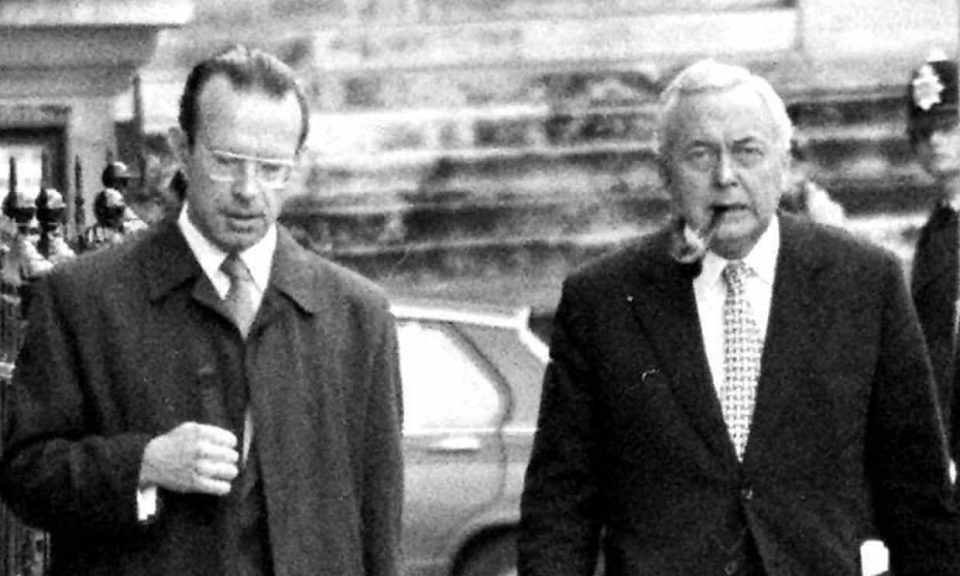The defining trait in the intricate personality of journalist Joe Haines, who passed away at 97, was his steadfast loyalty. He remained devoted to his family and a select group of close friends. He never lost sight of his working-class roots and the struggles of his upbringing, which informed his unwavering commitment to the journalistic profession that facilitated his rise.
During his career, Haines exhibited a deep personal loyalty to Harold Wilson, the politician, and Robert Maxwell, the publisher, both of whom significantly influenced his professional journey. However, overriding these relationships was his allegiance to the Labour Party, which perhaps also sheds light on some of his more ambiguous career choices.
Haines justified the publication of two books revealing the remarkable intrigues that transpired behind the scenes in Wilson’s office during his tenure as press secretary, arguing that such disclosures served the party’s interests.
His personal loyalty to Wilson, whom he served during various terms—first when he was Prime Minister from 1969 to 1970, then as leader of the opposition, and again during his second premiership starting in 1974—deteriorated amid the wave of criticisms surrounding Wilson’s resignation honors in 1976.
After departing from Downing Street, Haines joined the *Daily Mirror* in 1977 as a feature writer and later became the head leader writer in 1978. He defended his choice to remain with the paper after its acquisition by Maxwell in 1984, just two days after denouncing him as “a crook, a cheat, and a liar.” He claimed that by staying, he could help preserve the paper’s purported influential alignment with the Labour Party. Under Maxwell’s ownership, he served as assistant editor and political editor (1984-90).
Haines relished witnessing the dynamics of power from close proximity, whether within Downing Street or at the Mirror’s headquarters in Holborn, central London. He took pleasure in the role of adviser to both Wilson and Maxwell, feeling indispensable and flattered by their reliance on his sharp intellect and eloquent expressions.
Yet, alongside this self-importance, he also possessed a natural journalist’s impulse to disseminate information, which made it irresistible for him to narrate the tumultuous political dramas he encountered at Westminster.
His biography of Maxwell, published in 1988, faced scorn as a sycophantic portrayal, but it stemmed from Haines’s desire to feel valued. He was honored to have received the assignment, although he would later bitterly regret it after Maxwell’s death in November 1991 and the subsequent revelations of the extensive fraud he had committed.
Haines’s discomfort grew as he had initially acclaimed Maxwell as a heroic figure for the *Mirror Group* when his body was discovered at sea, only to later dismiss as “nonsense and falsehood” the swirling rumors of financial wrongdoing. A report by the Trade and Industry Department on the Maxwell scandal, published a decade later (2001), mildly admonished Haines, noting that he should have fulfilled the responsibilities of his position and thus bore some measure of accountability.
The professional shame from this incident left an indelible mark on his reputation, from which he never fully recovered. Although he briefly served as a political columnist for *Today* (1994-95), he eventually spent his retirement, embittered by his experiences in journalism and politics, in Tunbridge Wells, Kent, far removed from his roots in the London docklands.
Joe Haines was born to a father, also named Joseph, who worked as a stevedore and passed away in 1930, leaving his widow, Elizabeth, to raise young Joe and his two older sisters on her wages from cleaning at a hospital. It was said, in jest, that he exemplified the “Bermondsey dockers’ syndrome,” growing up tough with street smarts and a natural disdain for the elite. He recalled with nostalgia that for those without means, the Labour Party was a beacon, providing holiday trips for underprivileged children like himself, organized by trade unions.
His family enjoyed hop-picking “holidays” in Kent, their outings funded by their earnings from the orchards, and it was during this time that a young Joe developed a love for football. At the age of 14, after only basic schooling, he began working for the Press Association as a messenger boy. This was followed by a similar role with the Glasgow Herald before he moved up the ranks to lift boy and then to copytaker.
He read Dickens, perhaps sensing the opportunities depicted in his work; his ambition and intellect bore fruit when, in 1954, he became a parliamentary reporter for the Glasgow Bulletin. This role, along with his experiences in the Commons press gallery, paved the way for his subsequent ascent as a political correspondent with the Scottish Daily Mail in 1960 and with the Daily Herald in 1964 as it transformed into the Labour-supporting Sun prior to Murdoch’s ownership.
Having joined the Labour Party as a teenager, Haines was viewed as a Labour loyalist when Wilson offered him the position of deputy press secretary at Downing Street in 1969, a role he quickly ascended to within months.
The subsequent seven years leading up to Wilson’s unforeseen resignation—about which Haines claimed foreknowledge—are overshadowed by later revelations of intense conflicts among members of the Labour leader’s inner circle, alongside allegations of misconduct and scandal that often eclipsed Haines’s contributions to the political atmosphere of the time. He, along with his friend Bernard Donoughue, who later became Lord Donoughue and led the policy unit, often clashed with the head of Wilson’s political office, Marcia Williams (later Lady Falkender), in a continuous battle for the prime minister’s favor.
All three would later share their experiences in various publications, with the disputes and blame games persisting for more than four decades. Haines’s initial memoir, *The Politics of Power* (1977), was condemned by both Wilson and Falkender as “a collection of exaggerated information.” When he revisited the topic in *Glimmers of Twilight* (2003), he stirred controversy by claiming that Wilson’s physician, Lord (Joe) Stone, had once offered to “dispose of” Falkender.
Falkender passed away in 2019, coinciding with the year Haines released his final work, *Kick ’Em Back: Wilson, Maxwell and Me*, an assertive attempt to mitigate some of the damage to his reputation from his earlier portrayal of Maxwell.
One of Haines’s particular sources of bitterness stemmed from the peerages offered to several controversial businessmen named in the notorious “lavender list,” drawn up at Wilson’s retirement and supposedly penned on Falkender’s lavender stationery. Notably, Haines declined a peerage in 1976 and publicly stated his reasons, derisively mentioning that he did not engage in dancing, singing, or impersonations.
Significantly, Haines became the first press secretary to gain a public persona. This partly arose from his tumultuous interactions with parliamentary lobby journalists, leading to his unpopularity and public disputes with the media. In 1975, shortly after Wilson’s return as Prime Minister, tensions escalated to the extent that Haines paused lobby briefings temporarily, claiming it was to “teach the press a lesson.”
He also initiated legal action against the *Times* for referring to his staff as “professional liars.” Though he secured an apology out of court, he did not win many allies in journalism. In 2024, during an interview with the *Times*, he disclosed that Wilson had been involved with his deputy press secretary, Janet Hewlett-Davies, who had passed away the previous year.
In 2018, Haines referred to the Labour Party as “the party to which I have devoted my life.” Having been a member of the Bermondsey branch in his youth and serving as a councillor in Tonbridge, Kent, for nine years (1963-1969 and 1971-1974), he hosted a gathering in May 2024 to “renew old friendships and mend broken ones”—a symbolic farewell of sorts.
In 1955, he married Irene Lambert, who passed away in 2022.
Joseph Thomas William Haines, journalist, born January 29, 1928; died February 19, 2025.


